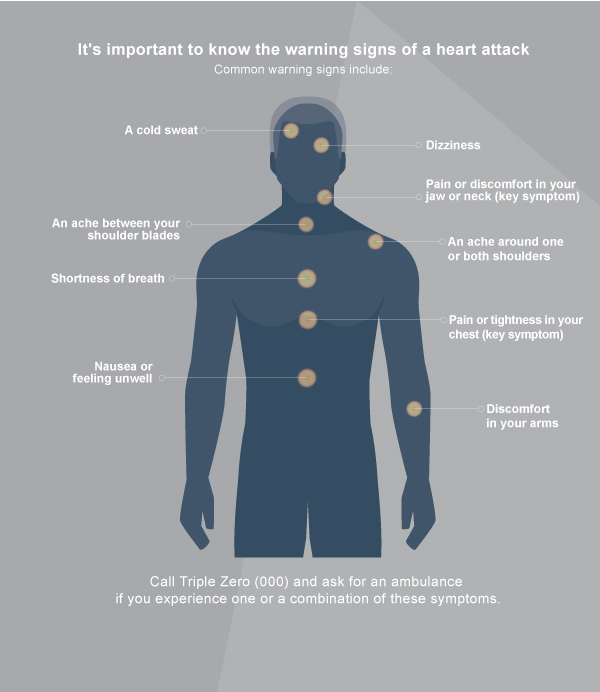-
With a heart attack, every minute counts.
Each year, around 54,000 Australians suffer a heart attack - this equates to one every 9 minutes.
Dr Yohan Nathan, Medibank Medical Advisor, says knowing the warning signs of a heart attack could save your life.
“Recognising the warning signs of a heart attack, and getting to hospital fast, can reduce the damage to your heart muscle and increase your chance of survival.”
According to Dr Nathan, the warning signs differ from person to person.“Symptoms may vary between individuals and someone who has already had a heart attack may have different symptoms the second time,” he says.
“Heart attacks are not always sudden or severe. Many start slowly, with only mild pain or discomfort. And some people might not get any chest pain at all, only discomfort in other parts of their upper body.”
Warning signs of a heart attack
Know the signs of a heart attack


-
You may have just one of these symptoms, or you may have a combination of them. Symptoms can come on suddenly or develop over minutes and get progressively worse. Symptoms usually last for at least 10 minutes.
Discomfort or pain in the centre of your chest. This can often feel like a heaviness, tightness or pressure. People who have had a heart attack have commonly described it as like “an elephant sitting on my chest”, “a belt that’s been tightened around my chest” or “bad indigestion”. The discomfort may spread to different parts of your upper body.
Discomfort in your upper body (arm/s, shoulder/s, neck, jaw or back). You may have a choking feeling in your throat. Your arms may feel heavy or useless.
Some people have also described feeling generally unwell or “not quite right”.
Act fast
If you have warning signs of heart attack that are severe, get worse quickly or last more than 10 minutes, call triple zero (000) immediately and ask for an ambulance.
“If you think you’re having a heart attack, don’t hesitate to call an ambulance,” says Dr Nathan “It’s better to go to hospital and be told it’s not a heart attack, than to stay at home until it is too late.”
For more information about the warning signs of heart attack, talk to your doctor.
-
What causes bad breath?
Find out how to keep your mouth smelling fresh
-
Signs to look out for when a cold is getting more serious
When you should see a doctor for a cold.
-
The health checks to keep in mind at different stages in your life
Have you had these health checks?
-
Bowel cancer: risks, symptoms, diagnosis and treatment
Learn more about bowel cancer
-
Flu myths debunked
Is 'man flu' real? Can you catch the flu from the flu vaccine? We separate flu facts from flu fictions.
-
Where to get health support in Australia
An Overseas Student Health Cover member’s guide to key health services and when to use them.
Subscribe to receive the best from Live Better every week. Healthy recipes, exercise tips and activities, offers and promotions – everything to help you eat, move and feel better.
By clicking sign up I understand and agree to Medibank's privacy policy





